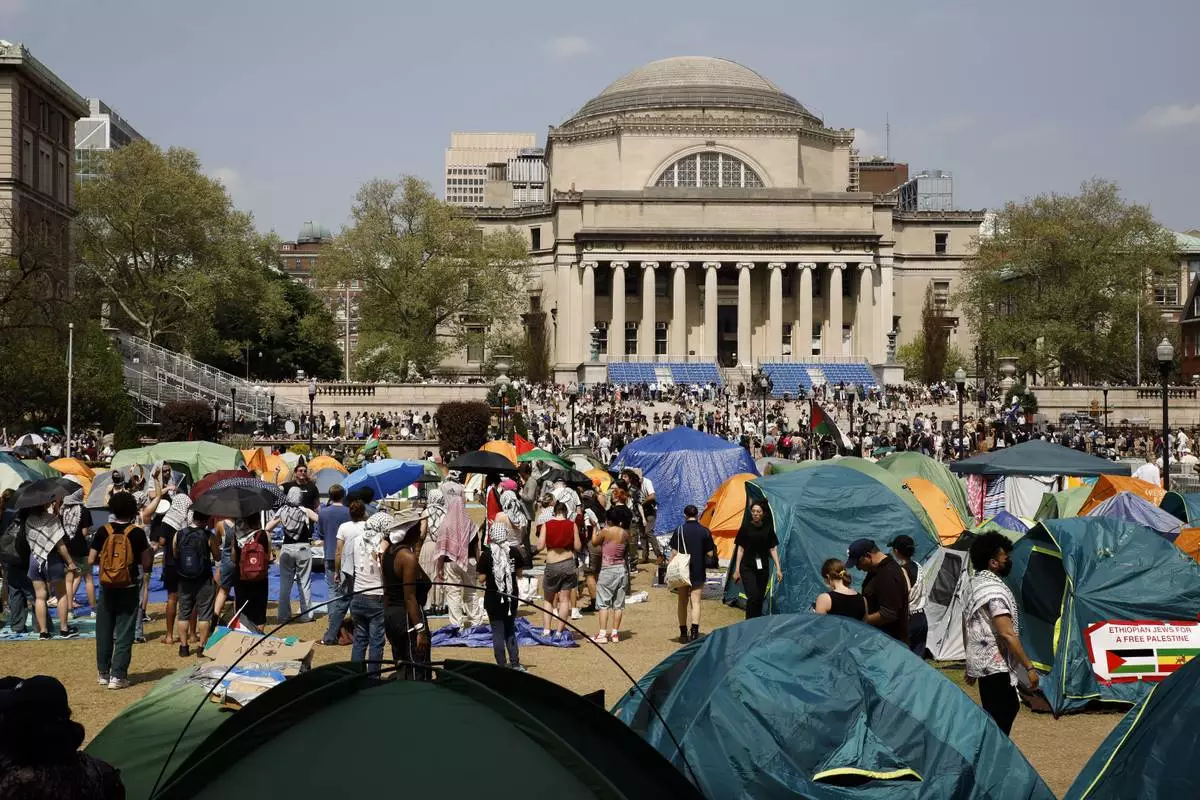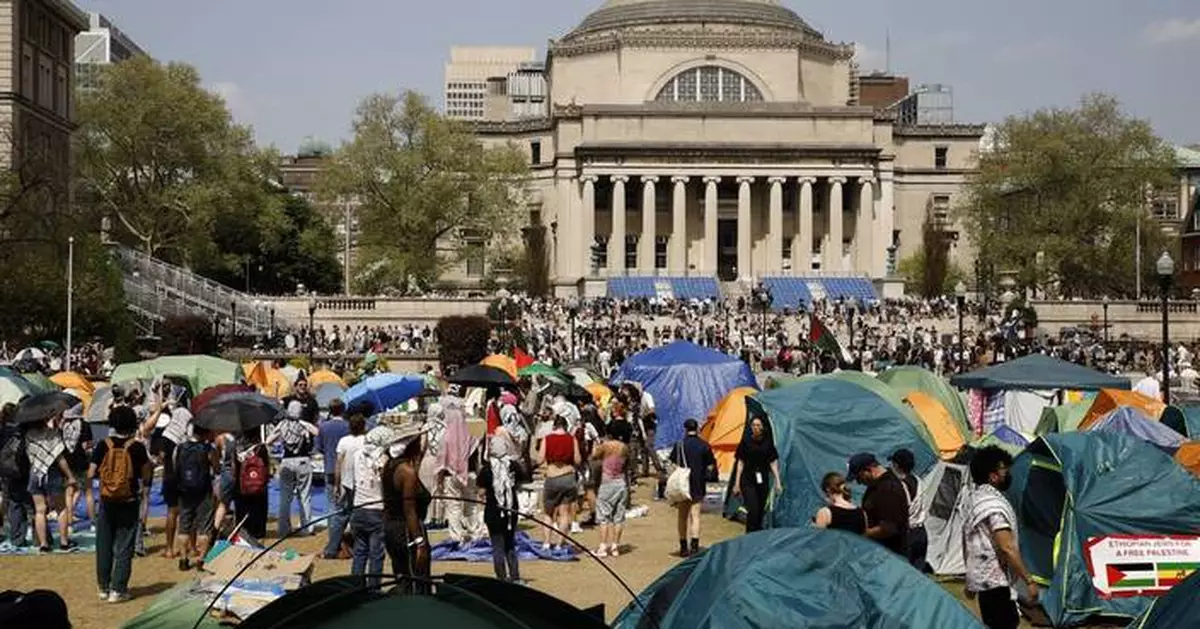NEW YORK (AP) — As Columbia University resumes classes Tuesday, students and faculty are planning, and bracing, for a resumption of the pro-Palestinian protests that convulsed the Manhattan campus at the tail end of the spring semester and touched off a wave of college demonstrations nationwide.
In recent weeks, the university’s new leadership has embarked on listening sessions aimed at cooling tensions, released a report on campus antisemitism and circulated new protest guidelines meant to limit disruption. But student organizers are undeterred, promising to ramp up their actions — including possible encampments — until the university agrees to cut ties with companies linked to Israel.
“As long as Columbia continues to invest and to benefit from Israeli apartheid, the students will continue to resist,” said Mahmoud Khalil, a graduate student who represented campus protesters in negotiations with the university. “Not only protests and encampments, the limit is the sky.”
The start to the school year comes less than a month after the resignation of Columbia’s president, Minouche Shafik, who brought police onto campus twice last spring to clear out protest encampments. When a small group of students occupied a university building, hundreds of police officers surged onto campus, making arrests and plunging the university into lockdown.
On Tuesday morning, dozens of pro-Palestinian protesters demonstrated outside one the school's entrances, some beating drums, while a long line of students and staff made their way through a security checkpoint. Other entrances had shorter lines, while some were shuttered with bike locks.
Since Shafik’s resignation, the interim president, Katrina Armstrong, has met with students on both sides of the issue, promising to balance students’ rights to free expression and a safe learning environment. While the message has inspired cautious optimism among some faculty, others see the prospect of major disruptions as all but inevitable.
“We are hoping for the best, but we are all wagering how long before we go into total lockdown again,” said Rebecca Korbin, a history professor who served on Columbia’s antisemitism task force. “There haven’t been any monumental changes, so I don’t know why the experience in the fall would look much different than what it did in the spring.”
In a report released Friday, the task force, made up of Columbia faculty, accused the university of allowing “pervasive” antisemitism to fester on campus following the Oct. 7 Hamas attack. The report recommended that the university revamp its disciplinary process and require additional sensitivity training for students and staff.
Demonstrations against the war have already started bubbling up on college campuses this semester, including one at the University of Michigan resulting in multiple arrests. While the handful of recent protests near Columbia have been minor, signs of last spring’s tumult are apparent.
The university’s tall iron gates, long open to the public, are now guarded, requiring students to present identification to enter campus. Inside, private security guards stand on the edge of the grassy lawns that students had seized for their encampment. A new plaque on a nearby fence notes that “camping” is prohibited.
Layla Hussein, a junior at Columbia who helped to lead orientation programming, described the added security measures as an unwelcome and hostile distraction.
“We’re trying to cultivate a welcoming environment. It doesn’t help when you look outside and it’s a bunch of security guards and barricades,” Hussein said.
Others have accused the university of treating the student protesters too leniently, arguing that a lack of clear guidelines would result in further turmoil this semester. Though some of those disciplinary cases remain ongoing, prosecutors have dropped charges against many of the students arrested last semester and the university has allowed them to return to campus.
“They violated every rule in the book and they openly state they’ll continue to do so,” said Elisha Baker, a junior at Columbia who leads an Israeli engagement group, adding: “We need to have a serious reckoning with the disciplinary process to make sure students have a safe learning environment.”
After Jewish students sued Columbia, accusing them of creating a dangerous environment on campus, the university agreed in June provide a “safe passage liaison” to those concerned with protest activity. In July, Columbia removed three administrators who exchanged private text messages disparaging certain speakers during a discussion about Jewish life in a manner Shafik said touched on “ancient antisemitic tropes.” One of the administrators had suggested in a text that a campus rabbi was going to turn concerns about antisemitism into a fundraising opportunity.
A spokesperson for Columbia said the university had since bolstered its guidelines around protests and developed new training for incoming students on antisemitism and Islamophobia.
The revised protest regulations require organizers to inform the university of any scheduled protests, barring demonstrations that “substantially inhibit the primary purposes of a given university space.”
“The University may restrict expression that constitutes a genuine threat of harassment, that unjustifiably invades an individual’s privacy, or that defames a specific individual,” the guidelines note.
Like many universities, Columbia is also in the midst of a contentious debate about the definition of antisemitism, and whether anti-Zionist speech — common at the student protests — should be seen as a form of discrimination.
At New York University, which also saw large-scale protests and an encampment last spring, an updated code of conduct now warns students that speech critical of Zionism could run afoul of its anti-discrimination policy. The move has drawn praise from major Jewish groups, as well as backlash from student groups and some faculty.
The Columbia task force report defines antisemitism as “prejudice, discrimination, hate, or violence directed at Jews, including Jewish Israelis,” “double standards applied to Israel” and exclusion or discrimination based on “real or perceived ties to Israel.”
Eduardo Vergara, a graduate student at Columbia who teaches literature in the Spanish department, said many instructors were going into the semester uncertain about what they could and couldn’t say in the classroom. He said he fully expected to spend much of the semester discussing the war in Gaza and the reaction on campus.
“It feels like everything is calm now,” he added. “I don’t think that’s going to last long.”
Associated Press writer Cedar Attanasio contributed to this repot.

FILE - Student protesters gather inside their encampment on the Columbia University campus, on April 29, 2024, in New York. (AP Photo/Stefan Jeremiah, File)
BALTIMORE (AP) — Lamar Jackson was solid in Baltimore's biggest game of the season so far.
Then, after one of the star quarterback's rare slip-ups, one of his teammates delivered the play of the day.
Jackson threw three touchdown passes and Marlon Humphrey scored on a fourth-quarter interception return to help the Ravens pull even with Pittsburgh atop the AFC North with a 34-17 victory over the Steelers on Saturday.
Pittsburgh (10-5) would have clinched the division with a victory, but now the teams are deadlocked after the Ravens (10-5) won for just the second time in the last 10 games in this series. Baltimore clinched a playoff berth. The Steelers had already done so.
“It was cool to get a pick-6, but clinching a spot in the playoffs, to beat the Steelers, I'm just happy that the guys came in, put in the work, and we just took care of business,” Humphrey said. “I felt that this team has had our number over the years. Just take care of business, man. I felt like the performance we put on wasn't perfect, but I felt like that's what we were supposed to do.”
Russell Wilson threw two touchdown passes, the second of which tied the game at 17 with 5:14 left in the third quarter. Jackson answered with a 7-yard scoring strike to Mark Andrews, and after Pittsburgh turned the ball over on downs, a 44-yard run by Derrick Henry put the Ravens in the red zone.
That drive came to nothing when Jackson was intercepted for just the fourth time this season, but then Humphrey — who was celebrating the recent birth of his son Duke — picked off Wilson and went 37 yards to the end zone to give Baltimore a cushion in a series that’s been razor-thin of late. The previous nine games between the Steelers and Ravens were decided by seven points or fewer.
“My whole family's in town to help out with my wife and everything,” Humphrey said. “I was texting her before. I'm supposed to go pick her up from the hospital, discharge her with the baby. So there's a lot of just great things that happened this week.”
Jackson improved to 2-4 against Pittsburgh as a starter. This was his first time facing the Steelers at home since 2020.
“I feel like we've been busting our behind all season long, had ups and downs throughout this whole season, but to clinch a playoff against a great team like that, that's great,” Jackson said. “That means we're moving in the right direction.”
Henry rushed for 162 yards.
Pittsburgh entered the game with a plus-18 margin in turnovers, but the Ravens had the edge in that department Saturday. Baltimore recovered three of its own fumbles and had two big takeaways.
“We didn’t control the run game. We never did. When you don’t, you’ve got to do some splash plays or win the turnover battle in a significant way, and we didn’t do that either,” Steelers coach Mike Tomlin said. “There were some balls on the ground that we didn’t get. Then obviously we turned the ball over going in -- it took seven points off the board -- and they had a pick-6. The rest is history, as they say.”
Jackson found Isaiah Likely for a 9-yard touchdown to open the scoring. Wilson answered with a 1-yard scoring pass to MyCole Pruitt, and the Steelers appeared poised to take the lead when the veteran quarterback broke loose for a 19-yard run in Baltimore territory.
But Ar'Darius Washington delivered a punishing hit on Wilson at the end of that play, jarring the ball loose. Kyle Van Noy recovered for the Ravens at the Baltimore 4.
The Ravens then drove 96 yards and took a 14-7 lead on Jackson's 14-yard touchdown toss to Rashod Bateman.
Wilson threw a 12-yard TD to Cordarrelle Patterson to tie it in the third.
Jackson set a team record with his 37th touchdown pass of the season, and he's now up to a career high of 3,787 yards.
Ravens receiver Zay Flowers had five catches for 100 yards, surpassing 1,000 on the season.
Henry has exceeded 1,500 yards rushing for the fourth time. He's now up to 1,636, a mark he's only surpassed once — in his 2,027-yard campaign of 2020.
Steelers CB Joey Porter Jr. injured his calf, and WR Ben Skowronek hurt his hip. ... Baltimore RB Justice Hill left the game because of a concussion.
Both teams play on Christmas Day to wrap up stretches of three games in 11 days. Pittsburgh hosts Kansas City on Wednesday and Baltimore plays at Houston.
AP NFL: https://apnews.com/hub/nfl

Pittsburgh Steelers quarterback Russell Wilson, left, gestures while scrambling against Baltimore Ravens defensive tackle Broderick Washington during the first half of an NFL football game, Saturday, Dec. 21, 2024, in Baltimore. (AP Photo/Stephanie Scarbrough)

Baltimore Ravens tight end Mark Andrews (89) celebrates with wide receiver Rashod Bateman (7) after scoring a touchdown during the second half of an NFL football game against the Pittsburgh Steelers, Saturday, Dec. 21, 2024, in Baltimore. (AP Photo/Nick Wass)

Baltimore Ravens wide receiver Zay Flowers reacts after making a catch against the Pittsburgh Steelers during the second half of an NFL football game, Saturday, Dec. 21, 2024, in Baltimore. (AP Photo/Stephanie Scarbrough)

Baltimore Ravens running back Derrick Henry runs with the ball against the Pittsburgh Steelers during the first half of an NFL football game, Saturday, Dec. 21, 2024, in Baltimore. (AP Photo/Stephanie Scarbrough)

Baltimore Ravens running back Derrick Henry busts a long run against the Pittsburgh Steelers during the second half of an NFL football game, Saturday, Dec. 21, 2024, in Baltimore. (AP Photo/Stephanie Scarbrough)

Pittsburgh Steelers running back Cordarrelle Patterson (84) catches a touchdown pass as Baltimore Ravens linebacker Malik Harrison defends during the second half of an NFL football game, Saturday, Dec. 21, 2024, in Baltimore. (AP Photo/Nick Wass)

Baltimore Ravens head coach John Harbaugh talks to an official during the second half of an NFL football game against the Pittsburgh Steelers, Saturday, Dec. 21, 2024, in Baltimore. (AP Photo/Nick Wass)

Pittsburgh Steelers head coach Mike Tomlin looks on during the second half of an NFL football game against the Baltimore Ravens, Saturday, Dec. 21, 2024, in Baltimore. (AP Photo/Stephanie Scarbrough)

Baltimore Ravens quarterback Lamar Jackson, left, and wide receiver Rashod Bateman (7) react after connecting for a touchdown pass and catch against the Pittsburgh Steelers during the first half of an NFL football game, Saturday, Dec. 21, 2024, in Baltimore. (AP Photo/Nick Wass)

Baltimore Ravens quarterback Lamar Jackson throws a pass against the Pittsburgh Steelers during the first half of an NFL football game, Saturday, Dec. 21, 2024, in Baltimore. (AP Photo/Stephanie Scarbrough)

Baltimore Ravens cornerback Marlon Humphrey (44) celebrates his pick-6 interception score with teammates during the second half of an NFL football game against the Pittsburgh Steelers, Saturday, Dec. 21, 2024, in Baltimore. (AP Photo/Nick Wass)

Pittsburgh Steelers quarterback Russell Wilson, bottom right, hits the turf as Baltimore Ravens cornerback Marlon Humphrey, left, returns an interception for a touchdown during the second half of an NFL football game, Saturday, Dec. 21, 2024, in Baltimore. (AP Photo/Stephanie Scarbrough)






















